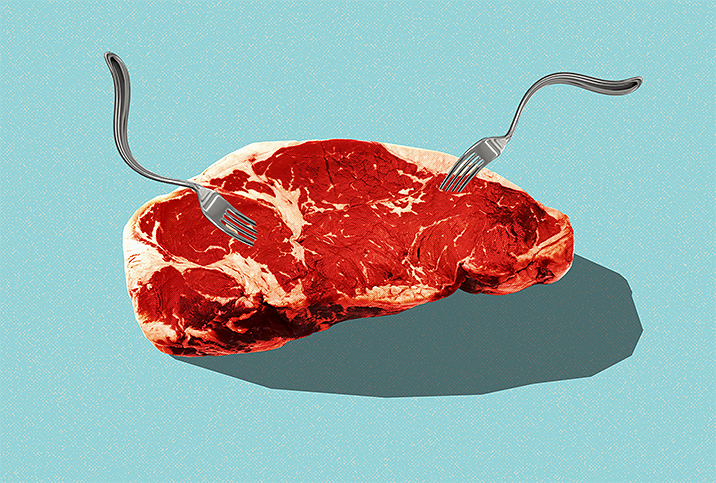Living More Sustainably With the Climatarian Diet

To be sure, the onus of climate catastrophe doesn't solely fall on the average person's shoulders. However, individuals' actions can collectively make a meaningful difference, and many people are looking to live more sustainably and conscientiously.
Enter the climatarian diet.
The term entered the popular lexicon in the mid-2010s and referred to a diet focused on mitigating the effects of climate change and generally minimizing ecological impact. Unlike other diets, this one isn't about cutting calories but rather your carbon footprint.
A diet that's planet-friendly and people-friendly
"The climatarian diet is basically a healthy, plant-based diet that's planet-friendly and people-friendly," said Lafina Diamandis, M.Sc., a London-based general practitioner and lifestyle doctor. "The point of following a climatarian diet is to help reduce greenhouse gas emissions and prevent climate change, which in turn protects biodiversity and over 1 million species currently under threat. Food alone is responsible for 24 percent of emissions, which is more than transport, and livestock is responsible for 50 percent of those emissions."
"When you think of a Western diet, what springs to mind?" asked Francesca Johnson, sustainability manager at Treepoints, an enterprise based in the United Kingdom focused on social and environmental causes. "Burgers, hot dogs, pizza and ice cream? It shouldn't come as a surprise as to why the Western diet not only has devastating consequences for our health but also for the environment. Meat and dairy make up the majority of items on a Westerner's plate, and it's those two products that have a catastrophic effect on the planet."
By cutting out meat and dairy for one month, the average person could save an average of 124,900 liters of water, 84 square meters of forest and 273 kilograms of CO2 emissions, Johnson said. However, although climatarianism encourages a plant-focused approach, it differs from vegan and vegetarian diets in that it doesn't exclude meat altogether.
'Food alone is responsible for 24 percent of emissions, which is more than transport, and livestock is responsible for 50 percent of those emissions.'
"The climatarian diet stresses reduced consumption of animal proteins and a shift toward a more plant-based diet," said Michelle Rauch, M.S., R.D.N., of Fair Lawn, New Jersey. "Instead of meat, legumes such as beans and lentils are suggested for their health and environmental friendliness. Meat, particularly beef, affects climate change through the emission of methane gas and by deforestation—forests converted for grazing of herds."
Another important distinction is climatarianism's emphasis on reducing the consumption of any products that have a substantial environmental impact. Without this consideration, a vegan diet in and of itself may not be as eco-friendly as you might think. A single avocado, for instance, requires more than 70 liters of water to grow and most are flown in from South America.
"The impact of your diet on the environment is not just about how many steaks you're getting through," Johnson said. "It's also about making informed decisions about what you put on your plate and where it's coming from."
Even small diet changes can help
Johnson noted food waste is another substantial issue contributing to CO2 emissions and landfill waste, both of which have significant adverse consequences. In the United States, about 150,000 tons of food waste are tossed out of households every day, according to research published in 2018 in PLOS ONE, amounting to 54,750,000 tons per year. Per the U.S. Department of Agriculture, 30 percent to 40 percent of the nation's total food supply goes to waste.
Altogether, proponents of climatarianism suggest following the diet could reduce your CO2 emissions by up to 1.5 tons a year. This is in addition to lowering your contribution to global natural resources consumption, habitat loss and more. Even if you don't go all in, small changes can make a significant impact.
"While there are various degrees of climatarianism, it is important to know that every action you take makes a positive difference," Rauch stated.
Unlike many diets, climatarianism is flexible and does not require followers to adhere to strict rules. Few foods are forbidden, though several product types are strongly discouraged. The basic principles include limiting or avoiding foods that:
- Require large amounts of natural resources, like water or land
- Contribute to pollution or greenhouse gasses
- Cause ocean acidification
- Contribute to waste
Foods generally off the menu include red meat, unsustainable fish, highly processed products, flown-in foods and products with excessive nonbiodegradable packaging. Climatarians also tend to reduce or eliminate dairy products and foods containing palm oil or sugar.
Other suggestions include:
- Opting for more plants and fewer animal products overall
- Choosing eco-friendly brands
- Selecting high-welfare, organic meat and dairy
- Eating seasonal fruits and vegetables
- Shopping locally whenever possible
"It's all about becoming more aware of how your food is produced, learning where it's coming from and understanding the negative impact of bringing some of these foods to market has on our environment," Rauch said.
How climate change affects our health
Climate change affects worldwide food availability and quality, which subsequently impacts public health. Depending on a person's location and socioeconomic status, individual effects can range from a higher grocery bill to malnutrition and starvation.
Rauch and Diamandis explained the contributions of various factors, including an increase in severe weather events, soil erosion and the difficulty of growing crops in regions where they once thrived. Rising sea levels and global heating have widespread and significant impacts, too.
"Climate change affects the social determinants on a large scale as it impacts air quality, sanitation and access to safe drinking water, food crops, agriculture and shelter," Diamandis said.
She noted that the World Health Organization predicts an additional 250,000 deaths per year due to malnutrition, malaria, diarrhea and heat stress by 2030 to 2050.
"Populations will also suffer directly from extreme weather events due to the death and displacement this causes," Diamandis continued. "We will see more mental health problems related to this and health problems related to water-borne diseases or heat-related illnesses. Unfortunately, it will be developing countries and the most vulnerable populations who will suffer the most. From a public health perspective, following a climatarian diet seems like one of the best ways to preserve and improve population health globally."
Multiple studies indicate a plant-centric diet can improve overall health and reduce the risk of chronic illness. A 2019 study published in the Proceedings of the National Academy of Sciences of the United States of America evaluated 15 food groups and found those with the lowest environmental impact had the most health benefits, including reducing the overall risk of chronic disease and mortality.
Also, consumption of red meat is linked to an increased risk of heart disease. In contrast, the consumption of pulses, a type of legume that makes for a sustainable and affordable meat substitute, correlates to improved blood pressure and cholesterol levels and decreased inflammation markers, Rauch noted.
"The climatarian diet also reduces your risk of heart disease, strokes and cancer through reducing consumption of red and processed meats that are associated with colon, breast, prostate and stomach cancer," Diamandis said. "Swapping red meat for plant proteins also reduces your risk of heart disease."
Another benefit of the climatarian diet is that foods grown locally tend to be more nutrient-rich than those flown in from faraway places, Rauch explained, because it takes less time for these products to make their way from the farm to the consumer's plate.
"Water-soluble vitamins such as vitamin C and the B-group, especially thiamin and folate, are less stable than other nutrients," Rauch added. "Therefore, exposure to heat and light during the time following harvest, processing, transportation and storage can have a negative effect on the nutritional value."
How to get started
The climatarian diet offers quite a bit of flexibility, making it easily customizable to anyone's abilities and needs.
"There is no such thing as a one-size-fits-all solution," Rauch noted.
For people who wish to eat more sustainably but aren't sure where to start, she recommended reevaluating your current diet and gradually phasing out animal products and highly processed foods.
"You don't have to go all out at first," she said. "Start with a 'Meatless Monday' or just swap out red meat for lean poultry or fish."
She also advised:
- Choosing seasonal, local produce, because producing foods out of season is energy-intensive, as is importing items from abroad
- Repurposing leftovers and freezing fresh produce for smoothies, stews and soups
- Avoiding overbuying at the grocery store to prevent waste
- Avoiding single-use plastics and using reusable cups, containers and silicone straws




















